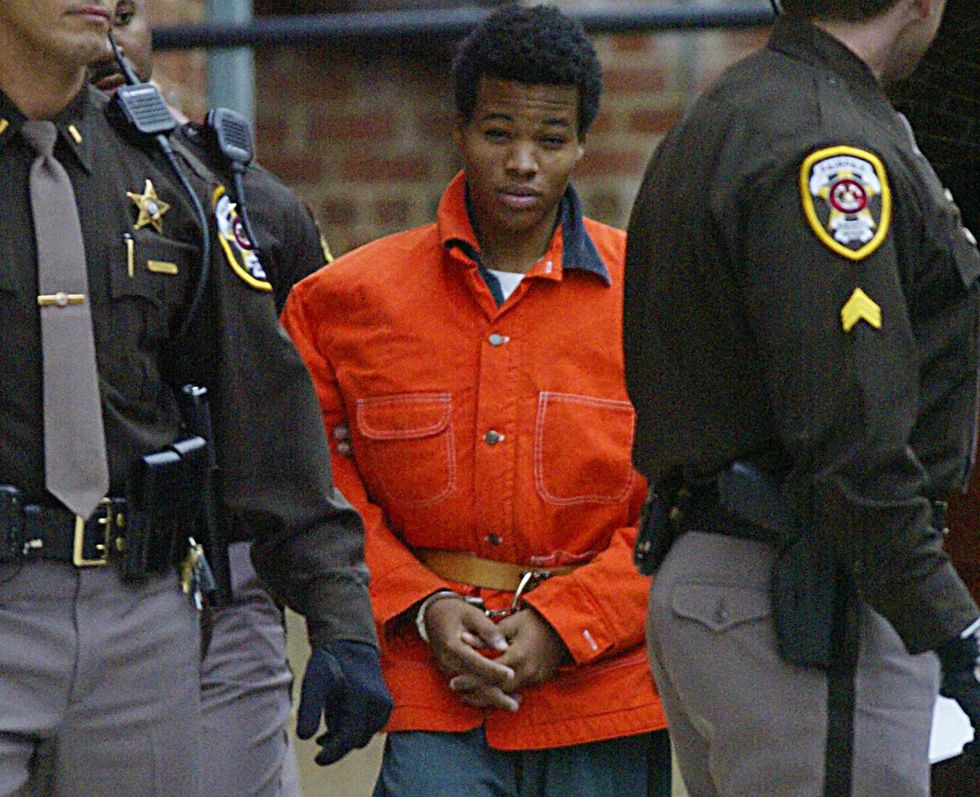
Convicted D.C. sniper Lee Malvo could receive a new sentencing hearing due to a 2017 U.S. Supreme Court decision prohibiting mandatory life sentences for minors. Malvo was 17 when he was convicted. (LUKE FRAZZA/AFP/Getty Images)

D.C. sniper Lee Boyd Malvo is serving several life sentences for his part in a 2002 crime spree that left 10 people dead. But a June ruling by the 4th U.S. Circuit Court of Appeals ordered that Malvo be resentenced in Virginia, citing a 2012 Supreme Court decision that deemed mandatory life sentences without the possibility of parole to be unconstitutional for juveniles.
Now, the Virginia attorney general and the state of Maryland are trying to stop Malvo's resentencing.
The Supreme Court's 2012 decision in the case, Miller v. Alabama, determined that "sentencing a child to life without parole is excessive for all but 'the rare juvenile offender whose crime reflects irreparable corruption.'" In 2016, that decision was made retroactive, allowing previously convicted minors to appeal their original sentences.
When Malvo was sentenced in Virginia, "irreparable corruption" was not discussed, which is why the appellate court ordered that Malvo was entitled to be resentenced. While the convictions were upheld against Malvo, a resentencing hearing could open the door to his possibility of parole.
Malvo won't be getting out of the six life sentences he is serving for the murders he committed in Maryland because they were not handed down under a mandatory sentencing scheme, but The Washington Post reported that a three-judge panel in Virginia unanimously agreed to allow new sentencing for the four murders he's convicted of committing in the state as a 17-year-old.
As a minor, Malvo joined fellow sniper John Allen Muhammad in carrying out fatal shootings of random victims in the D.C. area while hiding in the trunk of a car and aiming through a peephole.
Muhammad was put to death in 2009.
The StarTribune reported in August that Virginia Attorney General Mark Herring asked the U.S. Supreme Court to block the resentencing order from the Virginia court, arguing that Malvo's original sentencing does, in fact, comply with the rules under Miller v. Alabama because the judge had a choice to suspend some of Malvo's life term. Therefore, Herring argues, Malvo was not in fact sentenced under a mandatory sentencing scheme at all.
In the filing, Herring also called Malvo "one of the most heinous murderers" in Virginia's history.
Now, the Maryland Crime Victims Resource Center has filed an amicus brief supporting the AG's request, according to WJZ-TV.
Russell Butler of the Maryland Crime Victims Resource Center told WJZ he doesn't want Malvo's victims to have to relive the horror of the crimes with another hearing.
"It doesn't impact just one person, it impacts a lot of people," Butler said. "If the Supreme Court lets this decision go, there will be many people harmed. We believe that the brief is important so the Supreme Court realizes the impact of what's been done."
Malvo and Muhammed terrorized the D.C. metro area for 23 days in October 2002. The FBI's documented timeline of the case shows the unsuspecting victims were shot in public during everyday activities, like walking to school and pumping gas.
The two killers were busted after a caller claiming to be the perpetrator called authorities to say he had shot two women at a liquor store in Montgomery, Alabama, the month before. From there, an agent from Mobile was able to gather evidence from the scene, and fly to Washington to find a match in the fingerprint database.
The print matched Malvo from a magazine dropped at another crime scene in Washington state. An agent from Tacoma then recognized Muhammad's name from a tip called in, eventually linking the two men and identifying the vehicle used in the attacks.